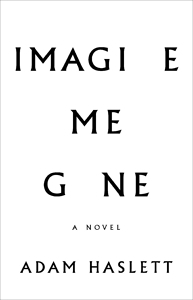Love was an Affliction
Adam Haslett’s Imagine Me Gone depicts a family grappling with a legacy of suicide
What is the nature of despair? How can one survive it? How does a family cope with the suicide of a beloved husband and father, or protect a son and brother beset with the same affliction? These are the questions that frame Adam Haslett’s emotionally harrowing new novel, Imagine Me Gone.

The central topic is one with which Adam Haslett is deeply familiar. In a recent interview with NPR, Haslett discussed his own father’s suicide when the author was fourteen, and both his and his brother’s struggles with depression. Haslett has explored this territory before—in his much-lauded debut story collection, You Are Not a Stranger Here, and his first novel, Union Atlantic—but never in a context so explicitly reminiscent of his own history: “When I came as a fiction writer to this material,” he told NPR, “I needed to find a way not so much to tell the story of my family but to tell a kind of counterfactual history, a sense of what might have been. Because I think in a sense we all carry some kind of guilt or regret about how we could have treated people we loved who were in trouble. And so I sort of needed that imaginary space to investigate that.”
The result is a deeply affecting study of a family told from multiple points of view: John, the doomed father; Michael, his depressed son; Margaret, who discovered the severity of her husband’s depression not long before their marriage but chose to move forward anyway; and Michael’s siblings, Alec and Celia, who struggle with how best to care for their fragile brother even as they try to cope with their own damage as children who lost their father to suicide.
The greatest of this novel’s many strengths is Haslett’s uncanny gift for inhabiting the consciousness of five enormously complex characters. The most ambitious and appealing of these voices is Michael’s. Unlike his father, whose depression leads to torpor, Michael’s episodes trend toward the manic. A hopeless romantic and music obsessive, Michael’s logorrheic rants on soul music, white guilt, and psychiatric pharmacology serve primarily as a window into his consciousness and secondarily as a source of levity to temper the novel’s bleakness.
It seems almost perverse, given what we know from the first chapter will become of him, to laugh out loud at Michael’s whimsical, frequently hilarious riffs on his own malaise. In one chapter, he lists the many medications he’s used and their effects, often to comic effect, though the list also serves as a biting account of the sometimes futile and ill-advised treatments prescribed to manage psychiatric conditions. The sum of these parts is a character who is both endearing and exasperating. Anyone who has ever loved someone similarly afflicted will be deeply touched by Michael, who embodies the struggle against what Andrew Solomon famously termed the Noonday Demon.
This sorrow is all the more acute for Michael’s mother and siblings because they have already experienced the worst possible outcome in a fight against severe chronic depression. In the novel’s early chapters, Haslett sensitively depicts Margaret’s anxiety as she watches her husband give in to his despair. John narrates his own final hours, enabling us to sense the persistent pain that has led him to the decision to end his own life. Michael’s siblings explore the persistent anxiety of life with a suicidal brother in the wake of their father’s suicide: they worry of course about where his illness will lead but also achingly recall their own innocence in the presence of their father’s decline.
 The novel’s title is drawn from one of its most stirring scenes: on vacation in New England, John is out on a rowboat with his two youngest children, returning from a trip to buy lobsters for dinner, when, abruptly, he lies down in the hull and says, “Imagine me gone, imagine it’s just the two of you. What do you do?” The children think their father is playing a game with them, but Celia, recalling this moment as an adult, knows that something darker and deeper is taking place—a kind of dress rehearsal for an act of surrender and abandonment that will cast a shadow over the rest of their lives.
The novel’s title is drawn from one of its most stirring scenes: on vacation in New England, John is out on a rowboat with his two youngest children, returning from a trip to buy lobsters for dinner, when, abruptly, he lies down in the hull and says, “Imagine me gone, imagine it’s just the two of you. What do you do?” The children think their father is playing a game with them, but Celia, recalling this moment as an adult, knows that something darker and deeper is taking place—a kind of dress rehearsal for an act of surrender and abandonment that will cast a shadow over the rest of their lives.
Indeed, while Michael is the tragic hero of Imagine Me Gone, Celia and Alec face profound struggles to connect with anyone outside their immediate family. Celia, a youth counselor, blames money problems for her inability to commit completely to her longtime live-in companion, but we sense acutely that the real source of her hesitance derives from the memory of what her mother had to endure in marriage. Alec, a political journalist, eventually finds love, but the relationship is stunted by his sense of responsibility for Michael. “Such lightness. It left me giddy,” Alec says, describing the moment after he and Seth first declare their love. “But right there, riding up the back of that swell of happiness—the thought of Michael. My brother—the perfect kill switch. So very reliable. The same switch thrown every time I reached the point of stepping outside myself.”
Imagine Me Gone is not a traditionally plotted novel but a psychological character study, written with the kind of patient intricacy one associates with nineteenth-century realists like the Russian masters or George Eliot—or, in contemporary American literature, Jonathan Franzen (Haslett’s former teacher). While the narrative is laced with moments of humor, there’s no getting around the fact that this book is primarily a document of despair. Many who have watched loved ones struggling with depression will find Michael’s ordeals painfully familiar, and seeing them reenacted on the page may be both harrowing and cathartic. < i>Imagine Me Gone reinforces what is already taken for granted among readers of literary fiction: that Adam Haslett is a writer of prodigious gifts, the greatest among them a deep compassion for his most flawed characters, and the courage to go with them into the abyss and bring their stories back to us with uncommon grace and boundless empathy.

Ed Tarkington’s debut novel, Only Love Can Break Your Heart, was published by Algonquin Books in January 2016. He lives in Nashville.


